Opinion: Trump tests the Oscar Wilde-P.T. Barnum theory
- Oops!Something went wrong.Please try again later.
- Oops!Something went wrong.Please try again later.
- Oops!Something went wrong.Please try again later.
Editor’s Note: Sign up to get this weekly column as a newsletter. We’re looking back at the strongest, smartest opinion takes of the week from CNN and other outlets.
“There is only one thing in the world worse than being talked about,” Oscar Wilde wrote, “and that is not being talked about.” Or as P.T. Barnum said, “Say anything you like about me, but spell my name right.”
“Trump” is even easier to spell than “Barnum,” but that’s not the real issue.
The theory that any publicity is good publicity helps explain why former President Donald Trump was the one to tell the world that he’s a target of a criminal investigation — in this case, special counsel Jack Smith’s probe into the January 6, 2021 Capitol riot. Trump is already facing charges from Smith over his handling of classified documents and from Manhattan District Attorney Alvin Bragg over a hush-money payment to adult film actress Stormy Daniels.
Trump’s announcement Tuesday that he had received a new target letter from Smith got his name back in the headlines, dimming the attention on his rivals for the GOP presidential nomination. And if the past is any indication, the news is likely to boost his fundraising. In addition to the financial benefit, the successive volleys of criminal charges feed Trump’s narrative that the government is being “weaponized” against him by Democrats.
While Trump’s critics may make the case that no one is above the law, the flip side of that argument is the spectacle of a presidential campaign being lofted by the application of the law. On Friday, the federal judge handling the classified documents case set a trial date for May 2024, scheduling the high-stakes courtroom confrontation for the same time presidential candidates are normally trying to wrap up their party’s nomination and prepare for the national convention and general election.
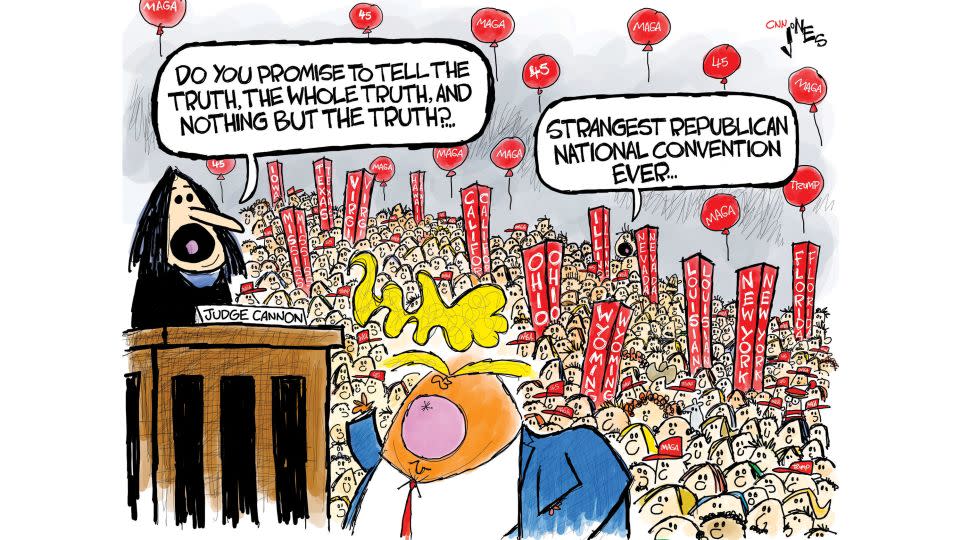
Accountability for past misdeeds is crucial, wrote Joanna Lydgate and Christine Todd Whitman, after Michigan’s attorney general Dana Nessel charged 16 people in a scheme to pose as “duly elected and qualified” electors falsely claiming Trump won the state’s electoral college votes.
“What happened between Election Day 2020 and January 6 was a conspiracy to overturn a free and fair election and keep Trump in power. It was carefully planned, then carried out, step by step, in multiple states.”
“And we can’t let it happen again. The way to make sure it doesn’t is to push for concrete consequences for everyone who was involved. Zero tolerance for anyone who tried to undermine our elections and the will of the people…
“The people who smashed windows and overpowered police officers that day had been fed lies about the 2020 election. The violence was the result of a conspiracy hatched weeks earlier to overturn the results, state by state.”
“There must be consequences for that, too.”
Trump’s lead in the Republican primary race — which is still in its very early stages — and the congressional GOP’s embrace of Trumpian stances on social policy is alarming to longtime moderates in the party. Former Rep. Adam Kinzinger made the case against the rightward turn: “Traditionally committed to national security, global stability and law and order, my Republican Party — yes, I am still a Republican — is now weakening on all three fronts. In doing so, it is fulfilling the cliche that extremists on the right and left eventually come together, like a snake eating its tail.”
“That’s not only bad for America, but bad for the prospects of the GOP — particularly in light of the fact that the party’s leading 2024 presidential contender is currently under both federal and state indictment and facing further potential charges in Washington, DC, and Georgia (all of which he denies wrongdoing in).”
For more:
Harry H. Schneider Jr.: Trump’s reasons for delaying his trial are incredibly weak
Second-term planning
The voters won’t have their say until next year, but, as the Economist and the New York Times reported, planning is well underway for a possible second Trump term. “The overarching goal is to make the former president more powerful than ever, enabling some of his autocratic inclinations,” wrote Frida Ghitis.
“The Department of Justice could lose its independence, coming under full control of the president, who would be able to mobilize it against his foes and protect his friends. Other independent agencies, those regulating the media or monopolies would also lose their autonomy if the strategy succeeds…
“The president’s power would reach every aspect of government if, as he promises, he reinstates ‘Schedule F,’ an executive order that would make it possible for tens of thousands of federal workers to be fired at the president’s whim and replaced with his acolytes.”
“Trump’s backers, meanwhile, working at a new think tank, are compiling lists of loyal Trumpists to fill key positions. Anyone with misgivings about the January 6 pro-Trump assault on the Capitol would reportedly be disqualified.” US support for NATO and for Ukraine as it fights off the Russian invasion could also be weakened.
The editors of the Economist noted that Trump is favored “to win the nomination in a country where general elections are determined by a few tens of thousands of votes. In victory, a team of practised demolition experts would prime their explosive ideas. The deconstruction of the administrative state could begin. The vain and tyrannical whims of an emperor-president would emerge from the rubble.”

Baking world
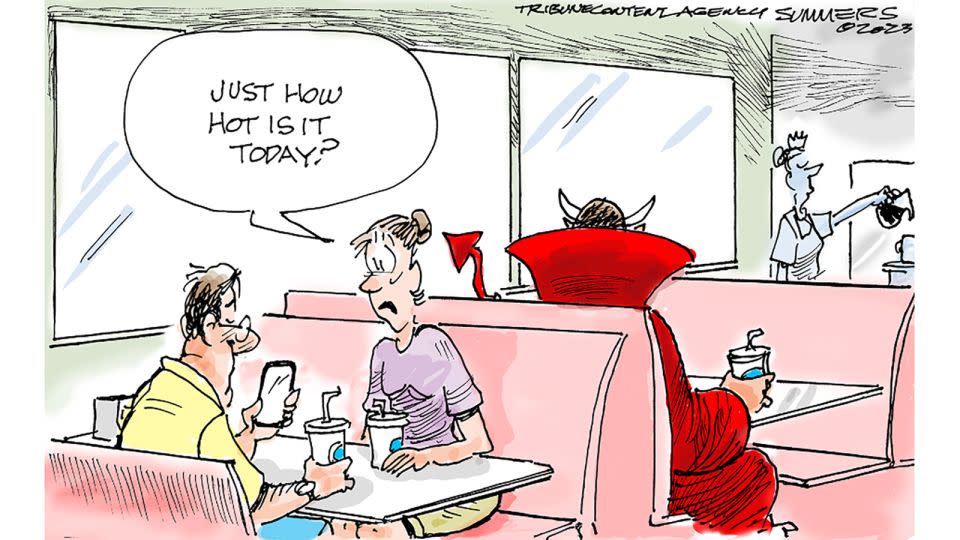
Record-breaking heat is baking parts of the US, China and Europe. Writing from Capena, a town about 15 miles north of Rome, Silvia Marchetti observed that “it’s not just the unbearable heat flattening you to the ground — it’s the nasty smell of it that lingers in the nostrils.”
“It’s a pungent, suffocating odor of dry grass ready to burn. Each time I look out the windows of my farmhouse at the lovely olive grove dotting the hill opposite, I’m afraid that a gust of wind might trigger a wildfire and turn it to ashes…”
“The dizzying heat is expected to peak early this week, with temperatures climbing above 45 degrees Celsius (113 Fahrenheit).”
“It’s not just Italy suffering, with the giant oven of hot air blasting other parts of southern Europe, like Greece and Spain…”
“What is most frightening is there is no escape: the hills, coast and mountains gave some respite with their fresh breeze. But now it’s just like being stuck in a city, with heat oozing out of pavements and bouncing off walls. The solace of shade is gone.”
Smoke and its lessons
Smoke from Canada’s wildfires continues to drift into the US. To Clare Frank, a firefighter who became the first woman to serve as chief of fire protection for California, America’s northern neighbor has a chance to avoid the mistakes the US made decades ago.
“This is Canada’s year to listen to its fires and pivot the way we should have,” she noted.
She recalled the Morse fire in Pebble Beach, California.
“On the night of May 31, 1987, all hands were called. We responded at midnight from 100 miles away as the blaze consumed multimillion-dollar homes scattered throughout the Del Monte Forest — a coastal paradise thought safe under its daily blanket of fog.”
“But partiers had left an illegal campfire burning in an abutting botanical reserve. Onshore winds carried its flames to wood-shingled roofs that were approved because they matched nature’s décor. Mission accomplished; homes were now part of the flora fueling the nightmare in front of us…”
“After a hard-fought 17-hour battle, the fire surrendered and left us to count its casualties: 15 firefighters injured, 31 homes destroyed — a big enough price tag for a wake-up call.”
“But instead of re-prioritizing home and human survivability over picturesque design, we yielded to a refrain that still gets sung every year: ‘We shall rebuild!’ If you check the real estate listings today, you can find your dream home with a wood-shingled roof tucked into the Del Monte Forest.”
Gilgo Beach
The killings of 11 people, whose bodies were found at Gilgo Beach on Long Island, remained unsolved for more than a decade. On July 13, authorities arrested architect Rex Heuermann and charged him with the murder of three of the victims. He pleaded not guilty.
“The women — Megan Waterman, Melissa Barthelemy and Amber Lynn Costello — as well as Maureen Brainard-Barnes, who Heuermann is also suspected of killing, worked as online escorts,” wrote Kara Alaimo. “The discovery of their remains, as well as those of seven other people in the same area, was critical in galvanizing public attention to the violence faced by sex workers…”
“Now, as the case moves forward, it’s important for investigators and the public to know whether the victims’ status as escorts was a contributing factor in why it took police over a decade to solve this case — and reconsider how we talk and think about other women who are the victims of unthinkable violence.”
RFK Jr.
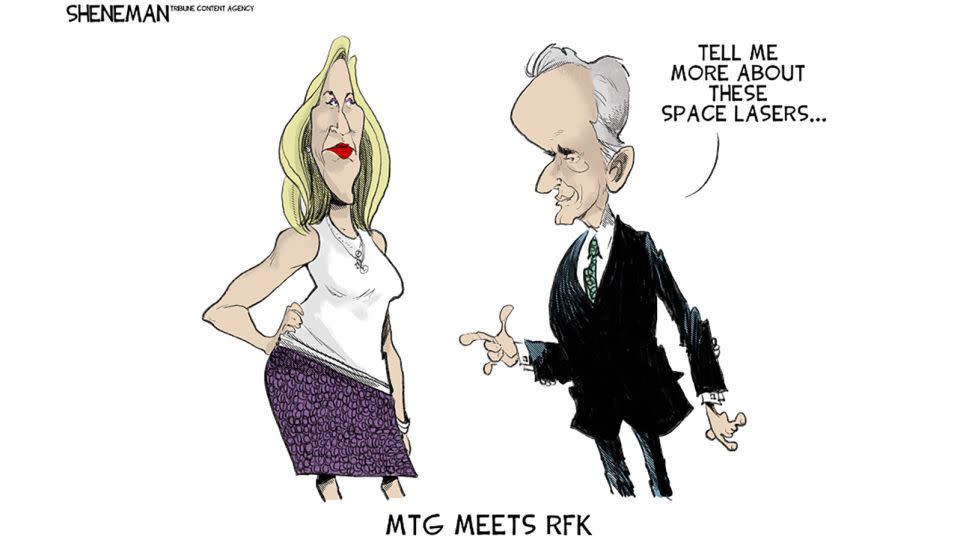
Robert F. Kennedy, Jr., who’s running for the Democratic presidential nomination, shared another completely unfounded conspiracy theory. As Dean Obeidallah wrote, “He irresponsibly and baselessly suggested that Covid might have been engineered to spare Ashkenazi Jews and Chinese people. … It’s just the latest example of Kennedy expressing absurd – but also dangerous – views on matters of public health.
“Last week, for example, he suggested that chemicals in drinking water could cause gender confusion among American children. And he has long been a prominent anti-vaccine activist, spouting disinformation about a link between childhood inoculations and autism.
“But Kennedy’s remarks on Covid for many people may represent a new low and were summarily debunked by scientists and rejected by civil rights and affinity groups.”
Meanwhile, the head of the Democrats’ progressive caucus, Rep. Pramila Jayapal, apologized for saying that Israel is a “racist” state, prompting House Republicans to pass a resolution asserting the contrary.
There’s no equivalency between the Kennedy and Jayapal comments, argued Rabbi Jay Michaelson. Kennedy’s remark “echoes 1,000 years of antisemitic conspiracy theories that Jews are responsible for, yet somehow immune to, plagues and disease — beliefs that led to actual Jews being murdered by angry mobs. It is wildly inaccurate — in fact, both Jewish and Chinese populations were heavily affected by Covid. And it is profoundly dangerous, stoking the flames of antisemitic and anti-Asian hate.”
“In the case of Jayapal, I would argue — though many would disagree — that her comments are not even antisemitic. I think they oversimplify and mischaracterize the specific dynamics of Israel’s treatment of the Palestinians, and that they can contribute to the kind of anti-Israel sentiment that does, indeed, sometimes slide into antisemitism. But that’s a far more attenuated relationship to bigotry than Kennedy’s overtly antisemitic discourse.”
For more on politics:
Julian Zelizer: Marjorie Taylor Greene gave Joe Biden an early Christmas present
John Avlon: Why a third-party 2024 presidential ticket is a dangerous gamble
Andrea Hailey: A dangerous trend for election disinformation
In custody in North Korea
A 23-year-old US soldier is believed to be in North Korean custody after he crossed the demilitarized zone separating the country from South Korea. What happens next? It might be instructive to remember the case of an 85-year-old businessman from Palo Alto, California, who was detained for six weeks by the North Koreans in 2013 while he was touring the country.
“Korean War veteran Merrill Newman, was taken off his Air Koryo plane as he waited to leave Pyongyang after a week-long tourist trip to North Korea and detained. No one — his family, the State Department, the media — had any idea why, and the North Koreans initially said nothing,” wrote Mike Chinoy.
“Eventually, it emerged that the detention was connected to Newman’s role during the Korean War, when he ran a group of anti-Communist Korean agents operating behind North Korean lines known as the ‘Kuwol Comrades,’ a reference to the Mt. Kuwol area south of Pyongyang, which was their key base.”
“A casual reference by Newman to one of his North Korean guides about having served with people in the Mt. Kuwol area convinced the always-suspicious North Korean security apparatus that he was some kind of secret agent returning to activate what they suspected — completely contrary to reality — was a geriatric network of spies.”
“However fanciful, the result was a weeks-long ordeal” for Newman, who died last year.
Barbenheimer
Summer is for superhero flicks and the light fare that amuses moviegoers who are just as likely to spend the day at the beach or in a pool as in a popcorn emporium. It’s assuredly not for serious films like Christopher Nolan’s “Oppenheimer.” Or at least that was the thinking before it opened last week, wrote Gene Seymour.
“Instead of a costumed superhero or a recycled action franchise, ‘Oppenheimer’ submits a case study, steeped in mid-20th century history, of one of that century’s most magnetic, vexing, enigmatic and ultimately, haunting geniuses. Even the shorthand description of J. Robert Oppenheimer as ‘the father of the atomic bomb’ compels an ambivalent reaction at best, a grand reputation with troubling, even tragic ramifications for both its owner and the world he helped transform so irrevocably…”
And yet the film isn’t entirely alien to the superhero genre, Seymour observed. “At once skittish and coy, self-effacing and self-aggrandizing, owlish and sexy, (Cillian) Murphy’s Oppenheimer is, at times, his own kind of super-powered being. A moviegoer unfamiliar with the particulars of the history here might be forgiven for wondering whether Murphy’s Oppenheimer is Obi-Wan Kenobi or Darth Vader. The correct answer is neither, or both, and there are far more relevant quandaries posed by the movie, those of loyalty, love, honor and ultimately, conscience.”
More in the swing of summer is “Barbie,” which also opened Friday. Holly Thomas put in a good word for Ken, played by Ryan Gosling. She described the moment when “the twice-Oscar-nominated star of ‘Half Nelson,’ ‘La La Land,’ ‘The Notebook,’ ‘Blade Runner 2049’ and ‘Drive’ was sent the script for Greta Gerwig’s ‘Barbie’ movie. The film depicts Ken as pure superficiality, the acme beta man who exists only under the glow of Margot Robbie’s Barbie gaze. After reading it, Gosling told Jimmy Fallon, he walked out into the backyard where he discovered his daughter’s Ken doll ‘face down in the mud.’ He immediately texted Gerwig a photo, writing: ‘I shall be your Ken, for this story must be told.’” (Warner Bros., which produced and distributed the film, shares a parent company with CNN.)
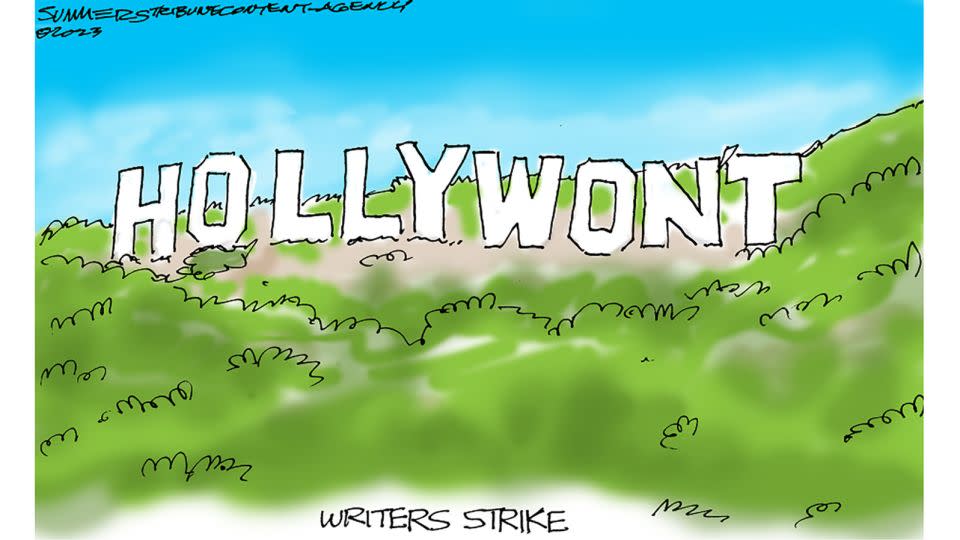
Don’t miss
Jim Pauley: E-bike and e-scooter battery fires are killing people. Here’s how to save lives
Wesleyan president Michael Roth: Why we’re ending preferential legacy admissions
Nicole Hemmer: Jason Aldean can’t rewrite the history his song depends on
Megan Ranney and Monique Rainford: Over-the-counter birth control pill could make a huge difference
Jill Filipovic: The southern border is a national shame
Robyn Ryle: As you cheer on America’s soccer stars in the Women’s World Cup, ask yourself this question
Jeremi Suri: Putin’s Cuba temptation
Priya Kumar: Mark Zuckerberg’s family photo raises this crucial question
AND…

Jane Birkin

Jane Birkin, who died last weekend at 76, knew it would happen. She told CNN’s Christiane Amanpour in a 2020 interview that after her death, people “will possibly only talk about the bag.”
As Elena Sheppard wrote, “The bag, of course, is the eponymous Birkin: the luxury Hermès handbag that, decades after its release in 1984, remains a status symbol for the rich and famous. The price tag is eye-watering — Birkins sell for anywhere between $10,000 and $450,000 — and the labyrinthine means of getting one adds to their exclusivity.”
“You can’t simply order a Birkin online or pop into Hermès and buy one. There are waitlists, auctions, vintage sources to be scoured. People stand by for months, or even years, for the Birkin they covet to become available.”
The reason the bag is named after Birkin is a story Sheppard tells well. But she also highlights the incongruity of the association between a super-luxury product and the countercultural, almost subversive figure Birkin presented. Her style was “more free-spirited insouciance. Birkin’s chicness was defined by seeming happenstance: enviable bangs that looked home-cut, nipples subtly visible through diaphanous blouses, crocheted dresses worn backwards for a more dramatic neckline, wicker baskets used as purses…”
“People are talking about the bag as the great definer of her life. But there was also her song ‘Je T’Aime … Moi Non Plus’ — so scandalous it was condemned by the Vatican — her stake in the ground as the ultimate in French girl chic, her films and theatrical performances and her daughters. There were her celebrated musical tours, which extended well into her 70s.”
Tony Bennett’s hope
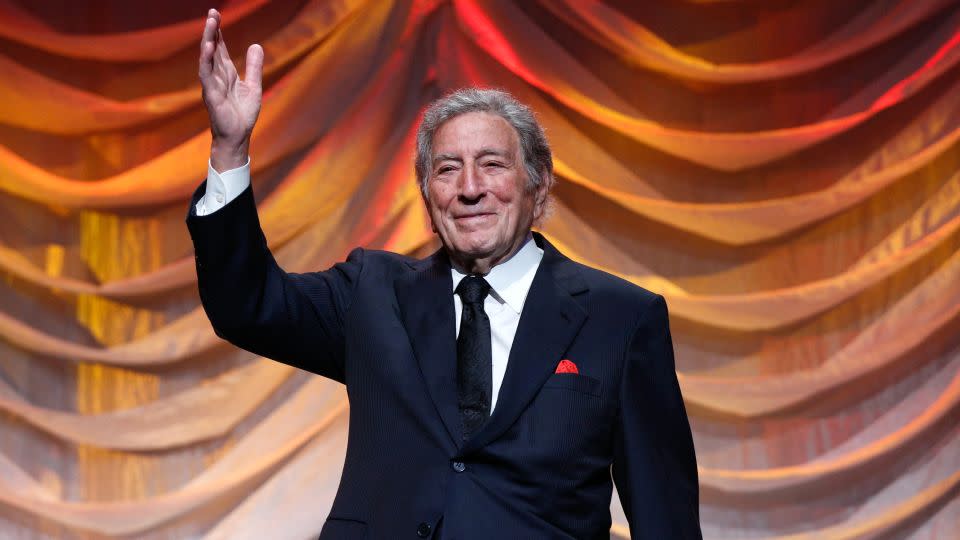
When Tony Bennett sang “Put On a Happy Face,” “Let There Be Love,” “If I Ruled the World,” or “The Good Life,” there was a unifying vision, wrote Gene Seymour. “With just about any other singer, these would come off as cloying or chirpy odes to complacency or evasion. But Bennett sounded surer than we did that we could make the world better.”
“After all, there was the great canon of American popular song as purveyed by the likes of Irving Berlin, Duke Ellington, George Gershwin, Cole Porter, Harold Arlen, and so many others who enriched his life and, he was convinced, could improve the lives of all who encountered their words and music.”
Bennett, who died Friday at 96, had a career that spanned eight decades, bridging the years from Frank Sinatra to Lady Gaga, CNN’s Catherine E. Shoichet noted.
Gene Seymour summed up those incredible years of achievement this way: “There were other singers whose voices may have conveyed more mystery and turbulence, even without Bennett’s vocal power and range. But at this bereft moment in time, I can’t think of a single one in any genre or subgenre of popular music who surpassed Bennett in the sheer, unfettered expression of hope. And heart.”
For more CNN news and newsletters create an account at CNN.com

